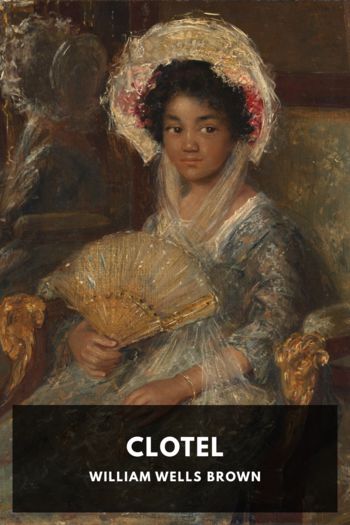Clotel - William Wells Brown (good books to read for beginners txt) 📗

- Author: William Wells Brown
Book online «Clotel - William Wells Brown (good books to read for beginners txt) 📗». Author William Wells Brown
“I suppose,” observed Carlton, “that they are like other people, flesh and blood.”
“Why, sir,” continued Parker, “I have never seen such people; building as they are next door to my residence, I see and have my eye on them from morning till night. You are never there, for I have never met you, or seen you once at the building. Why, sir, I am an early riser, getting up before day; and do you think that I am not awoke every morning in my life by the noise of their trowels at work, and their singing and noise before day; and do you suppose, sir, that they stop or leave off work at sundown? No, sir, but they work as long as they can see to lay a brick, and then they carry tip brick and mortar for an hour or two afterward, to be ahead of their work the next morning. And again, sir, do you think that they walk at their work? No, sir, they run all day. You see, sir, those immensely long, ladders, five stories in height; do you suppose they walk up them? No, sir, they run up and down them like so many monkeys all day long. I never saw such people as these in my life. I don’t know what to make of them. Were a white man with them and over them with a whip, then I should see and understand the cause of the running and incessant labour; but I cannot comprehend it; there is something in it, sir. Great man, sir, that Jim; great man; I should like to own him.”
Carlton here informed Parker that their liberties depended upon their work; when the latter replied, “If niggers can work so for the promise of freedom, they ought to be made to work without it.” This last remark was in the true spirit of the slaveholder, and reminds us of the fact that, some years since, the overseer of General Wade Hampton offered the niggers under him a suit of clothes to the one that picked the most cotton in one day; and after that time that day’s work was given as a task to the slaves on that plantation; and, after a while, was adopted by other planters.
The negroes on the farm, under “Marser Sam,” were also working in a manner that attracted the attention of the planters round about. They no longer feared Huckelby’s whip, and no longer slept under the preaching of Snyder. On the Sabbath, Mr. and Mrs. Carlton read and explained the Scriptures to them; and the very great attention paid by the slaves showed plainly that they appreciated the gospel when given to them in its purity. The death of Currer, from yellow fever, was a great trial to Mrs. Carlton; for she had not only become much attached to her, but had heard with painful interest the story of her wrongs, and would, in all probability, have restored her to her daughter in New Orleans.
XIX Escape of ClotelThe fetters galled my weary soul—
A soul that seemed but thrown away;
I spurned the tyrant’s base control,
Resolved at least the man to play.
No country has produced so much heroism in so short a time, connected with escapes from peril and oppression, as has occurred in the United States among fugitive slaves, many of whom show great shrewdness in their endeavours to escape from this land of bondage. A slave was one day seen passing on the high road from a border town in the interior of the state of Virginia to the Ohio river. The man had neither hat upon his head or coat upon his back. He was driving before him a very nice fat pig, and appeared to all who saw him to be a labourer employed on an adjoining farm. “No negro is permitted to go at large in the Slave States without a written pass from his or her master, except on business in the neighbourhood.”
“Where do you live, my boy?” asked a white man of the slave, as he passed a white house with green blinds.
“Jist up de road, sir,” was the answer.
“That’s a





Comments (0)